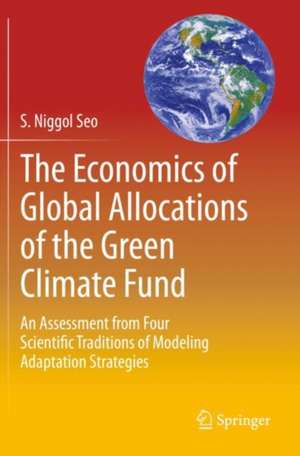The Economics of Global Allocations of the Green Climate Fund: An Assessment from Four Scientific Traditions of Modeling Adaptation Strategies
Autor S. Niggol Seoen Limba Engleză Paperback – 9 iul 2020
Substantially expanding and refocusing on the book Micro-behavioral Economics of Global Warming: Modeling Adaptation Strategies in Agricultural and Natural Resource Enterprises published by Springer in 2015, this book elucidates the theories and summarizes the empirical results and predictions from the four traditions of adaptation modelling: a microbehavioral economic model of adaptation, an agronomic-economic modelling, a statistical model of yield/productivity changes, and an ecosystem model of climate change impacts. The four modeling traditions are freshly analyzed and applied to the assessments of the 93+ GCF-funded projects and programs through the end of 2018.
| Toate formatele și edițiile | Preț | Express |
|---|---|---|
| Paperback (1) | 446.79 lei 38-44 zile | |
| Springer International Publishing – 9 iul 2020 | 446.79 lei 38-44 zile | |
| Hardback (1) | 554.86 lei 38-44 zile | |
| Springer International Publishing – 17 iun 2019 | 554.86 lei 38-44 zile |
Preț: 446.79 lei
Preț vechi: 551.59 lei
-19% Nou
Puncte Express: 670
Preț estimativ în valută:
85.49€ • 89.27$ • 70.60£
85.49€ • 89.27$ • 70.60£
Carte tipărită la comandă
Livrare economică 11-17 aprilie
Preluare comenzi: 021 569.72.76
Specificații
ISBN-13: 9783030182762
ISBN-10: 3030182762
Pagini: 266
Ilustrații: XIX, 266 p. 27 illus., 3 illus. in color.
Dimensiuni: 155 x 235 mm
Ediția:1st ed. 2019
Editura: Springer International Publishing
Colecția Springer
Locul publicării:Cham, Switzerland
ISBN-10: 3030182762
Pagini: 266
Ilustrații: XIX, 266 p. 27 illus., 3 illus. in color.
Dimensiuni: 155 x 235 mm
Ediția:1st ed. 2019
Editura: Springer International Publishing
Colecția Springer
Locul publicării:Cham, Switzerland
Cuprins
Chapter 1. Economics of the Green Climate Fund, Paris Agreements, and Global Funds and Currencies: An Overview.- Chapter 2. The Green Climate Fund: History, Institution, Pledges, Investment Criteria.- Chapter 3. The Microbehavioral Economic Models of Adaptation Behaviors to Global Warming.- Chapter 4. Agro-Economic Models for Measuring the Impact of Climate Change on Agriculture.- Chapter 5. Statistical Methods for Estimating Yield Changes Attributable to Climate Change.- Chapter 6. Ecosystem Modelers of Climate Change.- Chapter 7. Economics and Evaluations of the Green Climate Fund.- Chapter 8. Economics of Global Funds: United Nations Specialized Funds and Other Crypto, Crowdfunding, Green Funds.
Notă biografică
Professor S. Niggol SEO is a natural resource economist who specializes in the study of global warming. Born in a rural village in South Korea in 1972, he received a Ph.D. degree in Environmental and Natural Resource Economics from Yale University in May 2006 with a dissertation on micro-behavioral models of global warming. While at Yale, he learned from Professors Robert Mendelsohn and William Nordhaus (Nobel Prize in 2018) on the economics of global warming. Since 2003, he has worked on various World Bank projects on climate change in Africa, Latin America, and Asia. He held Professor positions in the UK, Spain, and Australia from 2006 to 2015. He has been on the editorial boards of the three journals: Climatic Change, Food Policy, Applied Economic Perspectives and Policy. He received an Outstanding Applied Economic Perspectives and Policy Article Award from the Agricultural and Applied Economics Association (AAEA) in Pittsburgh in June 2011 for developing a behavioral economic model of adaptations to climate change.
Textul de pe ultima copertă
This book provides an incisive and economic assessment of the global warming adaptation policy and programs carved out by the United Nations Framework Convention on Climate Change, the Green Climate Fund (GCF), by relying on the four scientific traditions that have been advanced on the economics of adaptation to climate change in agricultural and natural resource enterprises.
Substantially expanding and refocusing on the book Micro-behavioral Economics of Global Warming: Modeling Adaptation Strategies in Agricultural and Natural Resource Enterprises published by Springer in 2015, this book elucidates the theories and summarizes the empirical results and predictions from the four traditions of adaptation modelling: a microbehavioral economic model of adaptation, an agronomic-economic modelling, a statistical model of yield/productivity changes, and an ecosystem model of climate change impacts. The four modeling traditions are freshly analyzed and applied to the assessments of the 93+ GCF-funded projects and programs through the end of 2018.
Substantially expanding and refocusing on the book Micro-behavioral Economics of Global Warming: Modeling Adaptation Strategies in Agricultural and Natural Resource Enterprises published by Springer in 2015, this book elucidates the theories and summarizes the empirical results and predictions from the four traditions of adaptation modelling: a microbehavioral economic model of adaptation, an agronomic-economic modelling, a statistical model of yield/productivity changes, and an ecosystem model of climate change impacts. The four modeling traditions are freshly analyzed and applied to the assessments of the 93+ GCF-funded projects and programs through the end of 2018.
Caracteristici
Provides an assessment of the global warming adaptation policy Comprehensively reviews the Green Climate Fund Offers an explanation of the theory and major outcomes of adaptation studies
